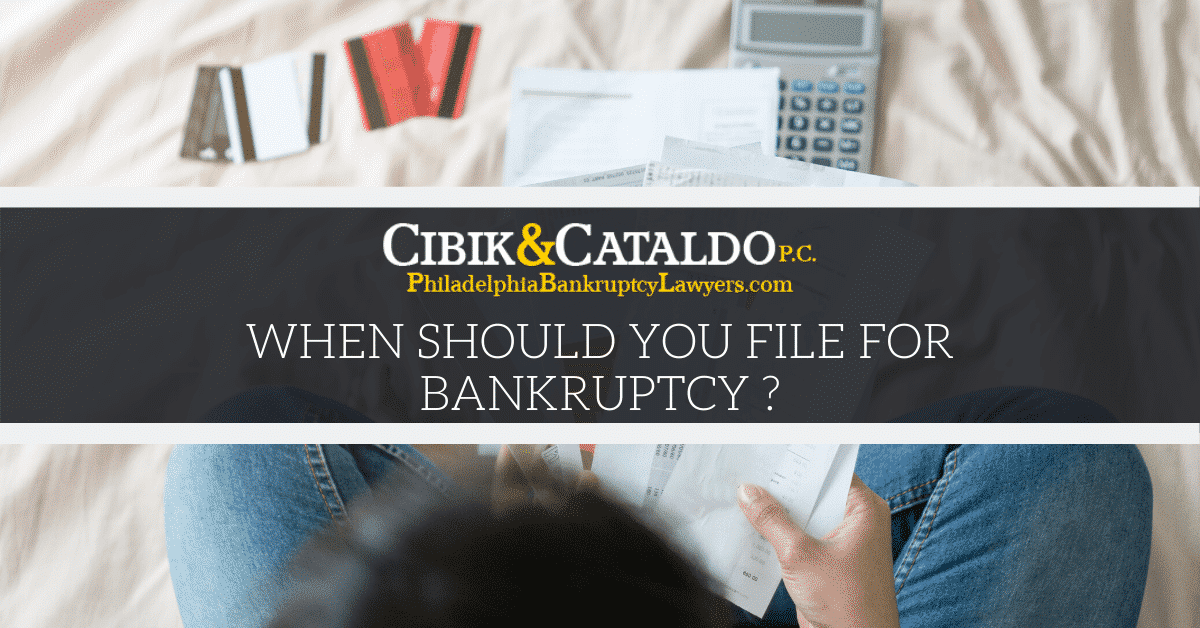
When Should You File For Bankruptcy ?
Some of the questions you will likely ask yourself before deciding to file bankruptcy include:
- How much do you owe on your credit cards and are you only making minimum payments?
- Are you using credit cards wisely or using them to pay for necessities?
- Do you feel like your finances are out of your control?
- Are you being contacted by bill collectors on a regular basis?
- Are you in danger of losing your home to foreclosure?
If your answer to one or more of these questions is yes, then the decision to file bankruptcy may be obvious. However, the challenge may be whether the timing of a bankruptcy filing is right. Timing matters in some cases because filing at the wrong time could mean you lose assets you might otherwise be able to keep, and because filing at the wrong time could hamper negotiations with creditors.
Chapter 7 and Chapter 13 Bankruptcy Filings
It is important to understand the differences between Chapter 7 and Chapter 13. Chapter 7 bankruptcy will eliminate many debts such as medical, credit card, and personal loan debts immediately upon discharge. A Chapter 13 will require you to enter into an agreement to repay most of your debts off over a period which may extend up to five years. During those five years, your debts will be paid down and any debt remaining at the end of the agreement will be eliminated. Most child support payments and tax payments which are in arrears cannot be discharged and may require payment in full regardless of a bankruptcy filing.
What to Avoid When Filing Bankruptcy
You can avoid problems with a bankruptcy filing by taking some proactive steps ahead of time. There are two specific situations where you can run into problems with a bankruptcy filing. The first is running up your credit cards to the maximum amounts with frivolous purchases such as high-end cell phones, large screen televisions, or other similar types of purchases. This does not mean if you or your child needs a warmer winter coat, or your heating system goes on the blink you should avoid using your credit card. However, one of the items the trustee may look at is what new credit you incurred over the last six months and how it was used. Frivolous purchases could be considered fraudulent use of bankruptcy which could lead you to face criminal charges.
The other issue is disposal of property which you have in your possession and transfer to another person or sell. You are well within your rights to liquidate or transfer any assets you own at any time. However, if you are considering filing bankruptcy, you want to make sure you have sold the property for market value and keep records of how the proceeds were used. This is important so the court does not suspect you have disposed of the property for the sole purpose of protecting it in a bankruptcy proceeding.
Keep in mind a bankruptcy trustee will review any property transfers made within certain time periods and they will investigate whether they believed the intention was to defraud your creditors. Should they be able to determine this is the case, they may claw back the asset from the person who purchased it or to whom you transferred the property.
Bankruptcy May be the Right Solution
Illness, divorce, or job loss can have a devastating impact on your finances, and you may need help deciding the best way to move forward and restore your financial life. People seldom go into debt thinking the best way out is to file bankruptcy but oftentimes, this is the only solution when you cannot seem to get out from under a burden of too much debt and circumstances in your life have made it difficult or impossible to pay that debt off.
For more than three decades, Philadelphia bankruptcy lawyers, Cibik Law, P.C., have been providing bankruptcy legal services in Philadelphia and the surrounding areas. When you feel like your debt has taken control of your life, we can help you take control of your finances by helping you find the right bankruptcy solution. Contact our offices today and let us help you find a way forward.




Sorry, the comment form is closed at this time.